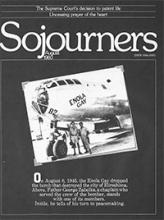In August, 1945, Fr. George Zabelka, a Catholic chaplain with the U.S. Army air force, was stationed on Tinian Island in the South Pacific. He served as priest and pastor for the airmen who dropped the atomic bombs on Hiroshima and Nagasaki.
He was discharged in l946. During the next 20 years he gradually began to realize that what he had done and believed during the war was wrong, and that the only way he could be a Christian was to be a pacifist. He was deeply influenced in this process by the civil rights movement and the works of Martin Luther King, Jr. and Mahatma Gandhi.
In 1972 he met Charles C. McCarthy, a theologian, lawyer, and father of 10. McCarthy, who founded the Center for the Study of Nonviolence at the University of Notre Dame, was leading a workshop on nonviolence at Zabelka's church. The two men fell into the first of several conversations about the issues raised by the workshop. Some time later, Zabelka reached the conclusion that the use of violence under any circumstances was incompatible with his understanding of the gospel of Christ.
When this article appeared, Fr. Zabelka was retired, gave workshops on nonviolence and assisted in diocesan work in Lansing, Michigan. The following is a 1980 interview with Zabelka, conducted by McCarthy. --The Editors
Charles McCarthy: Father Zabelka, what is your relationship to the atomic bombing of Hiroshima and Nagasaki in August, 1945?
Fr. Zabelka: During the summer of 1945, July, August, and September, I was assigned as Catholic chaplain to the 509th Composite Group on Tinian Island. The 509th was the atomic bomb group.
McCarthy: What were your duties in relationship to these men?
Read the Full Article

